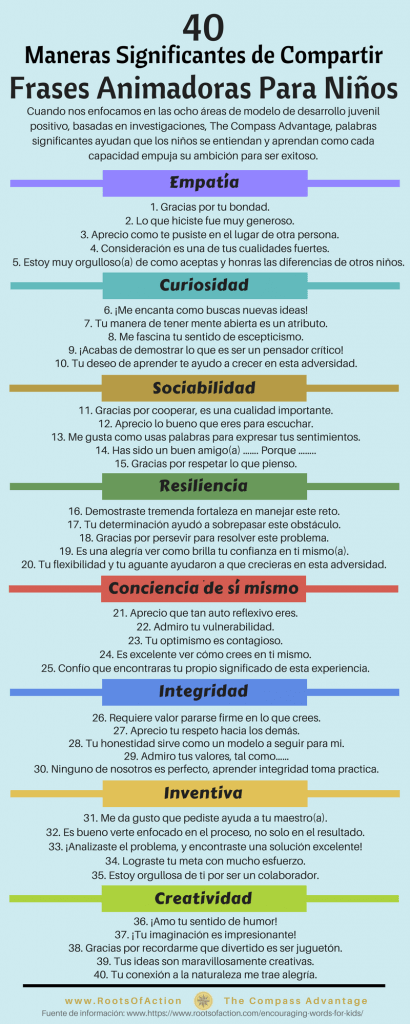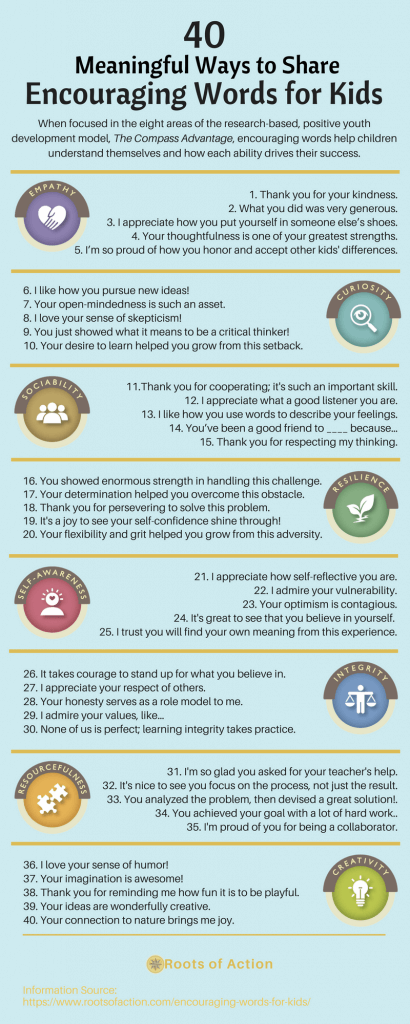
Your encouraging words for kids can help them thrive in school and life! How do your words matter?
Positive words from parents, teachers, and mentors are a rich source of internal motivation and guidance to children and teens. Often, kids recall your words of encouragement for years to come.
At Roots of Action, we recognize the story of childhood and adolescence as an interior journey of self-discovery and growth—the basis of a fulfilling life. Using the research-based positive youth development model, The Compass Advantage, we aim to develop a child’s eight core abilities: empathy, curiosity, sociability, resilience, self-awareness, integrity, resourcefulness, and creativity.
Encouraging words for kids, when focused in these eight areas of development, help children understand themselves and how each ability drives their success. Of course, there are many positive things to say to kids, like “I believe in you,” “You are important,” and “I’m proud of you.” But imagine how much more powerful words of encouragement can be if what we said connected with a child’s sense of self and emerging identity!
40 Meaningful Ways to Share Encouraging Words for Kids
Children and teenagers need to be encouraged to be themselves—to discover their own solutions to problems and their unique paths through life. You can remind them, in so many ways, how they are becoming their best selves!
Empathy
- Thank you for your kindness.
- What you did was very generous.
- I appreciate how you put yourself in someone else’s shoes.
- Your thoughtfulness is one of your greatest strengths.
- I’m so proud of how you honor and accept other kids’ differences.
Curiosity
- I like how you pursue new ideas!
- Your open-mindedness is such an asset.
- I love your sense of skepticism!
- You just showed what it means to be a critical thinker!
- Your desire to learn helped you grow from this setback.
Sociability
- Thank you for cooperating; it’s such an important skill.
- I appreciate what a good listener you are.
- I like how you use words to describe your feelings.
- You’ve been a good friend to ____ because…
- Thank you for respecting my thinking.
Resilience
- You showed enormous strength in handling this challenge.
- Your determination helped you overcome this obstacle.
- Thank you for persevering to solve this problem.
- It’s a joy to see your self-confidence shine through!
- Your flexibility and grit helped you grow from this adversity.
Self-Awareness
- I appreciate how self-reflective you are.
- I admire your vulnerability.
- Your optimism is contagious.
- It’s great to see that you believe in yourself.
- I trust you will find your own meaning from this experience.
Integrity
- It takes courage to stand up for what you believe in.
- I appreciate your respect of others.
- Your honesty serves as a role model to me.
- I admire your values, like…
- None of us is perfect; learning integrity takes practice.
Resourcefulness
- I’m so glad you asked for your teacher’s help.
- It nice to see you focus on the process, not just the result.
- You analyzed the problem, then devised a great solution!
- You achieved your goal with a lot of hard work.
- I’m proud of you for being a collaborator.
Creativity
- I love your sense of humor!
- Your imagination is awesome!
- Thank you for reminding me how fun it is to be playful.
- Your ideas are wonderfully creative.
- Your connection to nature brings me joy.
Encouraging Kids Boosts Positive Development
When parents and teachers use the types of encouraging words and phrases that are listed above, they boost kid’s development in all eight core areas. They also improve children’s belief in themselves, an attribute that is associated with happier, healthier children and teens. Encouraging words for kids increases their internal motivation to achieve and has a positive impact on developing characteristics like perseverance, self-confidence, determination, and imagination.
Encouraging Words Vs. Praise
Not all encouraging words for kids are created equal. So beware of the difference between encouragement and heaping praise upon children!
Some types of praise can do more harm than good. The key for parents and teachers is to think about how your encouraging words can have the most positive impact. Here are six tips to help make your words of encouragement for kids the most effective:
1. Be Honest
Children are the first to recognize when your words are not sincere. When kids believe you are praising or encouraging them to make them feel better, encourage different behavior, or protect their feelings, your words of encouragement can make them feel worse.
Praise and encouragement must be sincere and consistent.
2. Focus on Effort, Not Ability
When we share words of encouragement for kids that focus on their efforts rather than their abilities, we help children develop a growth mindset. Children who receive feedback about the effort expended in doing something learn to attribute their success to their efforts. They learn to understand that they have the ability to improve and master skills. When they fail, they are much more resilient, knowing their efforts can help them learn and grow from setbacks.
3. Be Specific
Probably the biggest error adults make in praising children is in the over-generalized way they give feedback. Comments like “good job” or “you are so smart” do nothing to help children identify how their efforts led to doing a good job! It is always better to be specific and descriptive, such as, “I appreciated the way you cooperated with your classmates. Your flexibility led to a better collaborative outcome.”
4. Avoid the Need to Compare
Today’s children are growing up in a world of comparisons. They compare themselves to their peers in almost everything they do, including grades, sports, and after-school activities. Sometimes, their own comparisons can motivate them to work harder, particularly if they are goal-setters.
When adults use words of encouragement to compare children to their peers, it places even more pressure on them than they already feel. Comments like, “You did so well today on the soccer field. Before you know it, you’ll be playing like Michael,” can depress rather than motivate children to learn from their efforts and develop a growth mindset.
Encouragement that uses social comparison teaches children that the end goal is winning, not learning.
5. Don’t Over-Encourage
Children shouldn’t receive praise or encouragement for everything they do. Research shows that overpraising is an extrinsic reward, not an intrinsic one. Overpraising decreases motivation and can result in the development of narcissistic kids.
Give words of encouragement for kids when it is unexpected, when their effort is linked to an outcome that contributes to their positive growth and development.
6. Don’t Use Encouragement to Control
It’s tempting to use encouraging words for kids in an effort to control their behavior. “You did a great job on your test, but I know you can do even better!” When encouragement is given in this way, children begin to believe that your approval is contingent on their performance. Whenever encouragement comes with conditions, it becomes harmful rather than helpful to a child’s positive development.
Infographic on Ways to Share Encouraging Words for Kids
You are invited to share the following infographic, “40 Meaningful Ways to Share Encouraging Words for Kids” on your social media, in Spanish or English! Or you may download an English PDF or Spanish PDF to print and post at home!
Published: November 21, 2017





